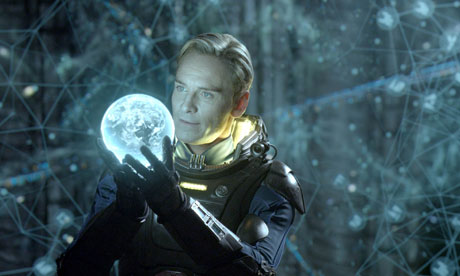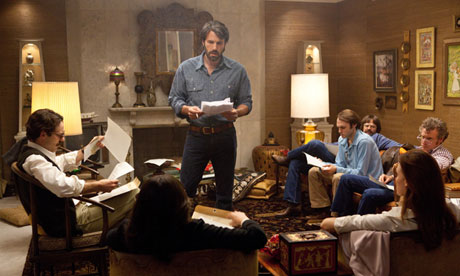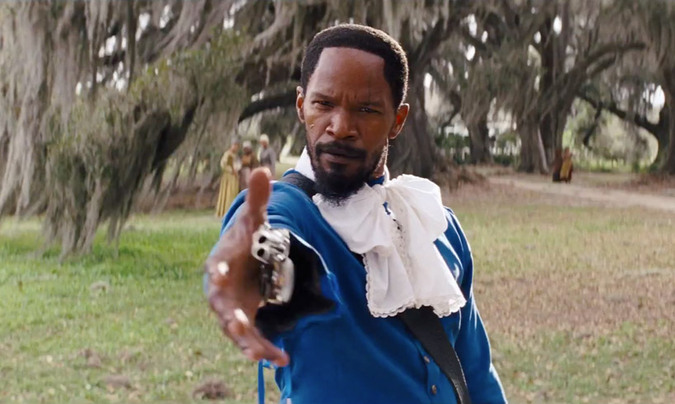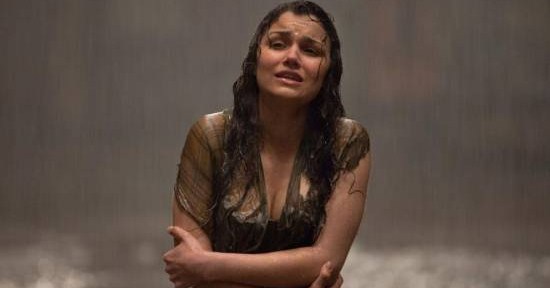It's been a long time coming, but I'm hoping to finally wrap up all of the year-end festivities this week. Last week I published the 2012 Jarmos, and later this week we'll look ahead to the coming year with my ten most anticipated films of 2013. But for now, here's my personal top ten list for the year 2012. This year, Oscar and I agreed much more on which films were best than last year (but I like to think last year was just a down year for me in regards to Oscar), but there's also a few blockbusters and highly-enjoyable films included here as well. Feel free to debate the selections.
JASON'S TOP 10 FILMS OF 2012
10. Prometheus (dir. Ridley Scott)
There were a number of people who were disappointed in Prometheus, whether it was it's Clarke-esque rumination on the origins of life in the universe that yielded no answers or the brief glimpse into the mythology of Alien (which Scott directed in 1979). By all measures, it was not an easy film to grasp. Was it an Alien prequel? A movie simply set in the same universe? But let's set that aside for now and enjoy the fact that a studio would not only greenlight such a perplexing film, but also position it as a summer blockbuster on the faith that audiences would give it a chance. The result is a film that's big on ideas and bleakly beautiful (or maybe beautifully bleak?). As the crew of Prometheus - lead by Noomi Rapace's wide-eyed scientist - descends upon a distant world, they seek the beginning of life. The movie doesn't completely deliver, but Michael Fassbender's performance as the ship's android, David, and a standout sequence involving a surgical machine provide plenty of reason to check it out.
9. Argo (dir. Ben Affleck)
Ben Affleck's career shift to directing has rewarded him greatly: with each film, he's only getting better. Argo brought him out of his native Boston and dropped him into the true story of how a CIA agent (Affleck) - with the help of the Canadian embassy and a Hollywood producer (played deliciously by Alan Arkin) - smuggled a group of Americans out of Tehran in the midst of the Iranian hostage crisis. Affleck shows his strengths at crafting taut thrillers, bringing genuine tension to the situation as the chaos builds around the hostages as they pose as a film crew (a scene in a Tehran market is particularly harrowing). It was the year's second-best historical thriller, and the film that's cemented Affleck's reputation as a director.
8. Flight (dir. Robert Zemeckis)
Flight pulls of a neat little trick: it begins with a terrifying plane crash sequence, then switches to a mature drama about pilot Whip Whitaker's (Denzel Washington, in his best performance since Malcolm X) struggle to sober up and take responsibility for his life. The film is a welcome return to live-action filmmaking for Zemeckis, who seemed intent on wandering the Uncanny Valley for the rest of his career before signing on to this film. But apart from John Gatins' excellent script and terrific performances from John Goodman as Whip's dealer and Kelly Reilly as the recovering addict trying to save Whip (as well as the aforementioned crash sequence), this is the Denzel show, and he gives the film a tremendous weight in his abrasively honest performance. He's a man lost in the wilderness of his own creation, and as he discovers, it's a place that's hard to come back from.
7. The Hunger Games (dir. Gary Ross)
I never read Suzanne Collin's successful young-adult novels, in which a futuristic society is divided into twelve districts, and children are selected from each district every year to fight for the right to go home alive. It's a harrowing premise (though not unlike that of Battle Royale), to be sure, but the film became an enormous sensation, one of the year's biggest movies. After seeing the film, I'm not so sure I want to read the novels, as I don't want the experience to be tainted. As a film, the casting of Jennifer Lawrence as Katniss - all steely nerve and killer instinct - is it's biggest strength, but the rest of the cast is excellent as well, and Ross' direction gives the film a Malick-does-the-apocalypse vibe. Watching Katniss choose to do her best to survive - and help others survive - rather than kill was a refreshing spin on this sort of tale. It was a thrilling ride; we'll see how director Francis Lawrence handles the sequel, Catching Fire, later this year.
6. The Master (dir. Paul Thomas Anderson)
Surely no one goes into a P.T. Anderson film expecting something straightforward and easy-to-digest, but no one was prepared for how dense The Master would be. As alcoholic WWII veteran Freddy Quell (Joaquin Phoenix) falls under the spell of hypnotic multi-hypenate Lancaster Dodd (Philip Seymour Hoffman) and his legion of cult-like followers, the film becomes more and more difficult to parse. However, repeat viewings yield a film that will only get better with age, and a plethora of gorgeous images to accompany the film's complex dissection of faith in America. All of this anchored by another masterful performance by Phoenix, who's innate sense of danger and spontaneity lends his performance an extra edge. This is a film that cinephiles and scholars will be discussing for years to come.
5. Lincoln (dir. Steven Spielberg)
Everyone knew this would be Oscar bait: Daniel Day-Lewis plays the 16th president, Sally Field appears as Mary Todd, Tommy Lee Jones plays crusty and stubbornly abolitionist Thaddeus Stevens, and Steven Spielberg directs from a script by playwright Tony Kushner. What no one could have guessed would that this would be Spielberg's best film in over a decade, an unexpectedly tense political thriller centered on the passing of the Thirteenth Amendment, which permanently abolished slavery in the United States. The film presents Lincoln as a complicated man, a shrewd strategist who's willing to do whatever it takes to bring the nation back together, regardless of legality. Day-Lewis gives the performance of the year in the role, giving equal weight to Lincoln's folksy storyteller and political gamesman. This is how all biopics should be: focusing on a pivotal moment in the subject's life, and exploring the complexity that made it happen.
4. Moonrise Kingdom (dir. Wes Anderson)
One of the interesting things that's often ignored in Anderson's films is that they're often painfully melancholic, despite their picture-book, moving-diorama visual aesthetic. Moonrise Kingdom finds young Sam (Jared Gilman) and Suzy (Kara Hayward) running away on a New England island in the 1960s, intent on starting their lives together as they explore first love. However, from the very beginning, the romance is tainted by the creeping realities of their situation: the adults trying to rescue them, the powerful storm wrecking havoc, the fact that being in love is never easy. The film is, above all, a delightfully brilliant and beautiful coming-of-age tale, with every frame serving as an indelible picture and every actor giving it their all. It's hands-down Anderson's best film since The Royal Tenanbaums, and maybe even better.
3. Django Unchained (dir. Quentin Tarantino)
I've been debating the placement of Tarantino's latest on this list. The film is hugely problematic, though at least it has America discussing race and slavery. It's perhaps half-an-hour too long, somewhat unfocused, and oddly airless in some places (I strongly believe that the absence of editor Sally Menke - who passed away in 2010 - is partly to blame here). And, bizarrely for a Tarantino film, Kerry Washington is wasted as Django's still-enslaved wife (Tarantino's films almost always have terrific roles for actresses). In the ranks of Tarantino's filmography, it's my second-least-favorite film. Yet Tarantino's worst films are often better than many filmmakers' best, and Django Unchained is an exciting twist on spaghetti westerns and continues Tarantino's march through history with revisionist zeal. Jamie Foxx does his best Man-with-No-Name as the title character, a reticent badass out to rescue his wife Broomhilda, and Christoph Waltz's chatty bounty hunter is clearly a more-enlightened distant cousin of Inglourious Basterds' Colonel Hans Landa. Then there's the supporting cast, including Samuel L. Jackson giving his best performance in years. I'll probably debate this placement for a while, but for now, it deserves this spot.
2. Beasts of the Southern Wild (dir. Benh Zeitlin)
No film was more surprising or more creative than this magnificent gem, which follows a young girl named Hushpuppy (Quvenzhane Wallis, in a stunning performance) who lives with her father (Dwight Henry, who was a local baker before being cast) in the Bathtub, a flooded bayou shantytown not unlike post-Katrina Louisiana. Zeitlin's film is incredible in its confidence as a slice of magical-realist allegory, a tale of growing up in a world that's unforgiving. That the cast is populated with non-professionals and first-time actors (particularly Wallis and Henry) makes it all the more amazing. There is absolutely nothing else like it in cinema, making this a wondrous one-of-a-kind experience. It's a film that must be seen in order to be fully understood. And it's only Zeitlin's first film; it's a hell of an act to follow-up.
1. Les Miserables (dir. Tom Hooper)
When critics review films, we like to think of ourselves as capable of viewing film differently from the average audience member. We break films down in terms of their individual components, debate the thematic material the filmmaker is creating a discourse of, and imagine ourselves tastemakers, the bourgeoise of cinematic audiences. But films are not meant to be viewed in a vacuum of objectivity; ultimately, a critic's dissection of a film is still rooted somewhat in opinion, and our emotional reaction to a film always colors our evaluation of it (as well it should). All of this is to say: yes, Tom Hooper's direction is at times questionable, especially in not opening up some musical sequences to wider shots. Yes, Russell Crowe's saddled with the worst character from the musical as the obsessively-driven Inspector Javert. Yes, it's a tad hokey, with its theme of love being the ultimate revolution. But Les Miserables earns the number-spot because no other film provoked such an incredible emotional response in me. Epinone (the radiant Samantha Barks, who is hopefully getting her pick of roles now) belting her romantic torment in the rain in "On My Own" stirred my heart. Former prisoner Jean Valjean (a career-best Hugh Jackman) expressing his admiration of Marius (Eddie Redmayne, hopefully a star now) in "Bring Him Home" was astonishing and beautiful. And of course, Fantine's (Anne Hathaway, who has never been better) gut-wrenching "I Dreamed a Dream" - the most perfect scene of this, or maybe any, year - left me devastated. Maybe it wasn't the most technically impressive film, or a feat of auteurist achievement. But no other film reminded me of why I fell in love with cinema in the first place: to laugh, to cry, to feel, to love, to live.










Comments